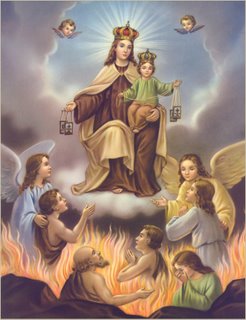 Short Version:
Short Version:
Saint Michael, Archangel, defend us in battle. Be our defense against the wickedness and snares of the devil. May God rebuke him, we humbly pray. And you, Prince of the heavenly host, by the power of God, thrust into Hell Satan and the other evil spirits who prowl the world for the ruin of souls. Amen.
Background Information:
One day after Mass and in a Conference with the Cardinals, Pope Leo XIII (1878-1903) fell down and received a vision of hell. Physicians ran to him to find no pulse; they feared that he had died. Yet, he opened his eyes only a few minutes later and screamed, "Oh what a horrible picture I was permitted to see!" In his visions, legions of devils flew from the depths of hell to cause destruction to the Church and damn souls. Suddenly St. Michael the Archangel appeared and fought the devils back into the abyss of hell. Following this, Pope Leo XIII created a prayer in honor of St. Michael.
Full version:
This original prayer was taken from The Raccolta, 1930, Benzinger Bros., pp. 314-315. The Raccolta is a collection of the official prayers which carry indulgences of the Catholic Church.
Most glorious Prince of the Heavenly Armies, Saint Michael the Archangel, defend us in "our battle against principalities and powers, against the rulers of this world of darkness, against the spirits of wickedness in high places" (Ephes., VI, 12). Come to the assistance of men whom God has created to His likeness and whom He has redeemed at a great price from the tyranny of the devil. Holy Church venerates thee as her guardian and protector; to thee, the Lord has entrusted the souls of the redeemed to be led into heaven. Pray therefore the God of Peace to crush Satan beneath our feet, that he may no longer retain men captive and do injury to the Church. Offer our prayers to the Most High, that without delay they may draw His mercy down upon us; take hold of the dragon, "the old serpent, which is the devil and Satan," bind him and cast him into the bottomless pit "so that he may no longer seduce the nations." (Apoc. XX.2)
In the Name of Jesus Christ, our God and Lord, strengthened by the intercession of the Immaculate Virgin Mary, Mother of God, of Blessed Michael the Archangel, of the Blessed Apostles Peter and Paul and all the Saints, we confidently undertake to repulse the attacks and deceits of the devil.
PSALM 67: God arises, His enemies are scattered and those who hate Him flee before Him.
As smoke is driven away, so are they driven; as wax melts before the fire, so the wicked perish at the presence of God.
V. Behold the Cross of the Lord, flee bands of enemies.
R. He has conquered, the Lion of the tribe of Juda, the offspring of David.
V. May Thy mercy, Lord, descend upon us.
R. As great as our hope in Thee.
(at the "+" make the sign of the Cross)
We drive you from us, whoever you may be, unclean spirits, all satanic powers, all infernal invaders, all wicked legions, assemblies and sects; in the Name and by the power of Our Lord Jesus Christ, + May you be snatched away and driven from the Church of God and from the souls made to the image and likeness of God and redeemed by the Precious Blood of the Divine Lamb. + Most cunning serpent, you shall no more dare to deceive the human race, persecute the Church, torment God’s elect and sift them as wheat. + The Most High God commands you. + He with whom, in your great insolence, you still claim to be equal, "He who wants all men to be saved and to come to the knowledge of the truth" (1 Tim., 11.4). God the Father commands you. + God the Son commands you. + God the Holy Ghost commands you. + Christ, God’s Word made flesh, commands you. + He who to save our race outdone through your envy, humbled Himself, becoming obedient even unto death" (Phil, 11,8); He who has built His Church on the firm rock and declared that the gates of hell shall not prevail against Her, because He will dwell with Her "all days even to the end of the world" (St. Mat., XXVIII,20). The sacred Sign of the Cross commands you, + as does also the power of the mysteries of the Christian Faith. + The glorious Mother of God, the Virgin Mary, commands you. + She who by her humility and from the first moment of her immaculate Conception, crushed your proud head. The faith of the Holy Apostle Peter and Paul and of the other Apostles commands you. + The blood of the Martyrs and the pious intercession of all the Saints command you. +
Thus, cursed dragon, and you, diabolical legions, we adjure you by the living God, + by the true God, + by the holy God, + by the God "who so loved the world that He gave up His only Son, that every soul believing in Him might not perish but have life everlasting" (St. John, III); stop deceiving human creatures and pouring out to them the poison of eternal damnation; stop harming the Church and hindering her liberty. Begone, Satan, inventor and master of all deceit, enemy of man’s salvation. Give place to Christ in whom you have found none of your works; give place to the One, Holy, Catholic and Apostolic Church acquired by Christ at the price of His Blood. Stoop beneath the all-powerful Hand of God; tremble and flee when we invoke the Holy and terrible Name of Jesus, this Name which causes hell to tremble, this Name to which the Virtues, Powers and Dominations of Heaven are humbly submissive, this Name which the Cherubim and Seraphim praise unceasingly repeating: Holy, Holy, Holy is the Lord, the God of Armies.
V. O Lord, hear my prayer.
R. And let my cry come unto Thee.
V. May the Lord be with thee.
R. And with thy spirit.
Let us pray. God of Heaven, God of earth, God of Angels, God of Archangels, God of Patriarchs, God of Prophets, God of Apostles, God of Martyrs, God of Confessors, God of Virgins, God who has power to give life after death and rest after work, because there is no other God than Thee and there can be no other, for Thou art the Creator of all things, visible and invisible, of whose reign there shall be no end, we humbly prostrate ourselves before Thy glorious Majesty and we beseech Thee to deliver us by Thy power from all the tyranny of the infernal spirits, from their snares, their lies and their furious wickedness; deign, O Lord, to grant us Thy powerful protection and to keep us safe and sound. We beseech Thee through Jesus Christ Our Lord. Amen.
From the snares of the devil, deliver us, O Lord.
That Thy Church may serve Thee in peace and liberty, we beseech Thee to hear us.
That Thou may crush down all enemies of Thy Church, we beseech Thee to hear us.
(Holy water is sprinkled in the place where we may be.)
Save to Print Full Size
Who May Say This Prayer?
“The Holy Father (Pope Leo XIII) exhorts priests to say this prayer as often as possible, as a simple exorcism to curb the power of the devil and prevent him from doing harm. The faithful (laity) also may say it in their own name, for the same purpose, as any approved prayer. Its use is recommended whenever action of the devil is suspected, causing malice in men, violent temptations and even storms and various calamities. It could be used as a solemn exorcism (an official and public ceremony in Latin) to expel the devil. It would then be said by a priest, in the name of the Church and only with a Bishop’s permission" (
Angelus Press 1962 Daily Missal).




















.jpg)




















